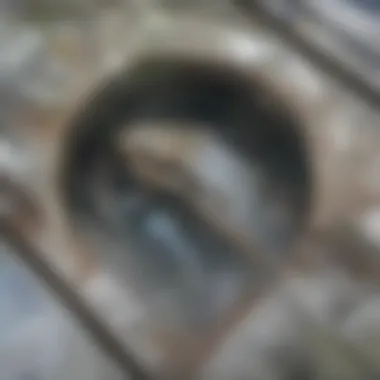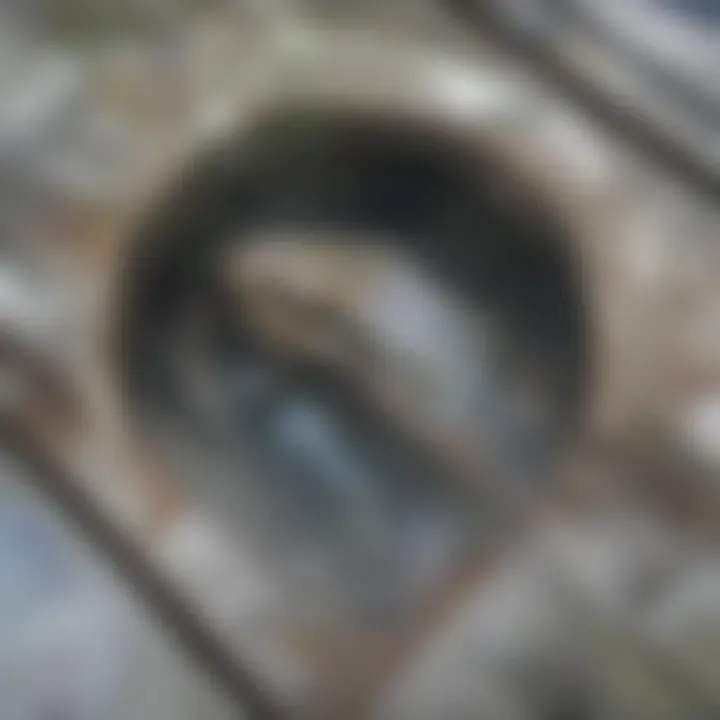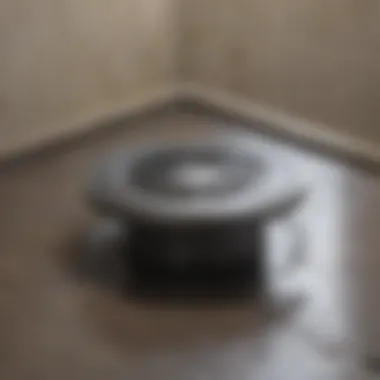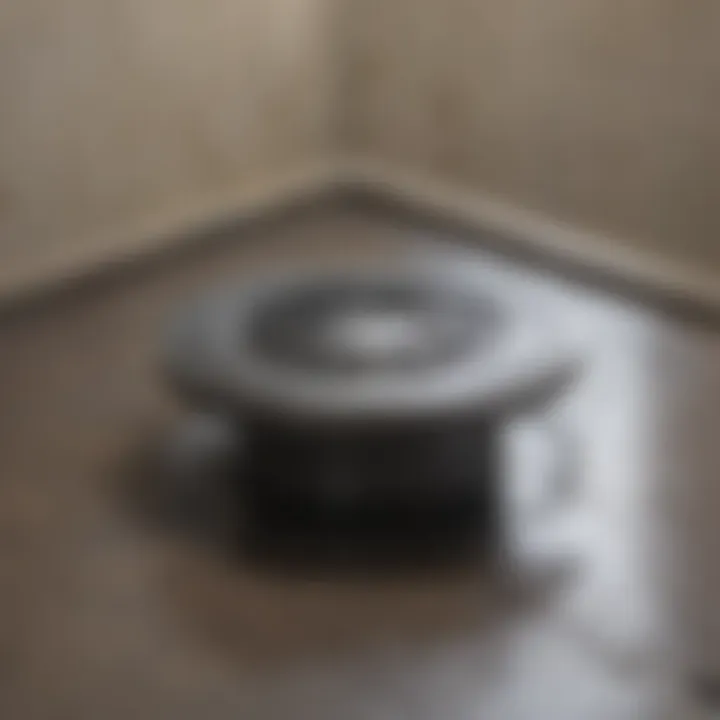Natural Shower Drain Declogger: Eco-Friendly Solutions


Intro
Clogged shower drains present an almost universal annoyance, impacting homes across various architectural styles and designs. The intrusion of water pooling around feet while showering is not just inconvenient; it hints at underlying problems that can escalate further. Addressing these clogs effectively is essential, not just for comfort but also to maintain an efficient plumbing system.
In an effort to combat these pesky issues, homeowners are increasingly turning towards natural solutions. This article delves deeply into the realm of natural shower drain decloggers, discussing the effectiveness of various methods, both homemade and commercially available. Key considerations include eco-friendliness, ease of application, and prevention strategies to ward off future clogs. Armed with knowledge, one can tackle shower drain problems sustainably without relying on harsh chemicals.
Understanding Shower Drain Clogs
Understanding shower drain clogs is a crucial step in tackling common plumbing problems faced by homeowners. This knowledge armors individuals with the ability to identify, address, and prevent issues effectively. Familiarizing oneself with how clogs develop assists in recognizing the signs early and applying the right solutions before they escalate into more significant troubles.
Moreover, an in-depth comprehension of these clogs paves the way for discerning which natural solutions may be most effective. By grasping the fundamentals, individuals can exercise better judgment when choosing between homemade remedies or commercial products.
Common Causes
The most frequent culprits behind shower drain clogs include hair, soap scum, and other debris. Hair strands, particularly long or thick ones, tend to accumulate and form nests that obstruct water flow. Furthermore, soap residue can build up over time, combining with hair and creating mounds that are difficult to shift.
Factors like the type of flooring or drainage system also play a role. For instance, older plumbing may be more prone to clogs due to outdated materials and designs. Additionally, how regularly drains are cleaned significantly influences clog formation. It is beneficial to identify these common causes to mitigate them effectively.
Signs of a Clog
Recognizing the signs of a clog is paramount in avoiding further damage. Several indicators can alert homeowners to potential issues:
- Slow Drainage: Noticeably delayed drainage when water is turned on is often the first sign that trouble is brewing.
- Unpleasant Odors: Foul smells emanating from the shower drain can indicate decomposing organic matter trapped within.
- Gurgling Sounds: If the drain gurgles when water is flowing, air bubbles may be struggling to escape through a blockage.
- Backflow Issues: Water backed up during showering sessions suggests a significant obstruction that needs immediate attention.
"Recognizing signs early enables better decision making and reduces potential impact on daily life."
Being attuned to these signs empowers homeowners to act promptly and seek natural solutions that fit their environmental values. Understanding shower drain clogs not only facilitates awareness but also aligns with the overarching goal of maintaining sustainable and efficient drainage systems.
Importance of Natural Solutions
Addressing the issue of clogged shower drains with natural solutions has become increasingly pertinent in today's environmentally conscious society. Recognizing the importance of these solutions is crucial for various reasons, particularly their effectiveness, the preservation of the environment, and the safety of the individuals using these products. Natural solutions embody an approach that aligns with sustainable living while also ensuring the well-being of both inhabitants and ecosystems.
Many homeowners are becoming more aware of the environmental impact caused by conventional chemical cleaners. The use of synthetic substances can result in detrimental effects on local waterways, soil, and even air quality. By choosing natural alternatives, homeowners can significantly reduce the amount of harmful chemicals entering the environment.
Furthermore, natural solutions offer a multifaceted approach to effectively unclog drains. Ingredients like baking soda, vinegar, and salt not only serve as efficient cleaning agents, but also contribute to the long-term maintenance of a drainage system. This preventive measure can help to maintain clear drains without the frequent need for harsh chemicals, making it a desirable option for many.
Besides the environmental concerns, an increasing number of people are cautious about the health implications of traditional chemical drain cleaners. Chemical solutions can often be aggressive, leading to potential respiratory issues or skin irritation upon contact. The carefully selected ingredients found in natural decloggers, in contrast, minimize these risks. This is particularly vital for households with children or pets, who may be more susceptible to adverse effects from harsh chemicals.
In summary, the emphasis on natural drain decloggers highlights the benefits of sustainable living, effective cleaning, and health safety. Adopting these solutions not only resolves immediate clogging issues, but also fosters a healthier relationship with the environment and personal health. Homeowners should therefore consider natural options as a priority when tackling shower drain clogs.
Environmental Concerns
Using natural solutions to declog shower drains represents a thoughtful choice when considering ecological impact. The conventional drain cleaners often contain strong chemicals that can poison aquatic ecosystems. When these products enter water systems, they may harm aquatic life, promote algae blooms, and contribute to pollution. By opting for environmentally friendly solutions, using natural ingredients can significantly mitigate these risks. Not only is this advantageous for wildlife, but it also paves the way for cleaner, healthier communities where nature and human habitation coalesce harmoniously.
Health Implications of Chemicals
The health concerns related to chemical drain cleaners are increasingly alarming. Traditional drain cleaners may possess corrosive properties that can lead to skin burns and lung irritation. These risks are elevated in enclosed spaces often found in residential bathrooms. By engaging with natural declogging methods, one enjoys a safer environment free of the toxic fumes commonly emitted by chemical options. This is particularly valuable for households with vulnerable individuals, ensuring that cleaning practices do not adversely affect their health. Choosing safer alternatives reduces the risk of accidental exposure or harmful reactions, fostering a healthier living space overall.
Homemade Natural Drain Decloggers
Homemade natural drain decloggers offer an appealing alternative to harsh chemicals commonly used for clearing clogs. Conveninece is a significant factor, as many people already have these ingredients in their kitchens. Using natural solutions is not only effective but also environmentally friendly. Homemade remedies can be less expensive and safer for both users and pets, making them a preferred choice for many homeowners. The power of these mixtures lies in their chemical reactions, which can break down tough buildup without causing damage to pipes.
Baking Soda and Vinegar
Baking soda and vinegar are a classic combination for unclogging drains. The alkalinity of baking soda helps to dissolve grime and hair, while vinegar’s acidity tackles the grease. The reaction produces bubbling that can effectively dislodge any blockages. To use this method, first, pour half a cup of baking soda directly into the drain followed by half a cup of vinegar. Let it sit for about 30 minutes, then flush with hot water. This is gentle on pipes and highly effective for minor clogs.
Salt and Hot Water


Salt is an unexpectedly powerful agent against clogs. It works by dehydrating organic buildup. When combined with hot water, this method can soften and wash away debris. To try this method, simply use a cup of salt and a liter of boiling water. Pour the salt down the drain first, followed by the hot water. Allow it to sit for about 15 minutes before running more hot water from the tap. This method is particularly useful for grease buildups often found in kitchen drains.
Soap and Water Solutions
A soapy solution can aid in breaking down grease that accumulates in drains. Liquid dish soap acts as a lubricant, helping to loosen tough debris. To apply this method, mix a cup of liquid soap with two cups of boiling water and pour directly into the affected drain. Allow it to sit for a few minutes before running hot water through the drain. It can be surprising how effective this simple remedy can be in restoring flow without the need for commercial products.
Homemade natural drain decloggers not only help clear clogs but also promote a healthier environment by reducing chemical usage.
Commercial Natural Drain Decloggers
The increasing need for eco-friendly solutions to common household problems has paved the way for commercial natural drain decloggers. These products offer an efficient and sustainable alternative to traditional chemical cleaners. The importance of this topic lies in the fact that many homeowners seek effective methods that minimize environmental impact while addressing the issue of clogged drains. Commercial natural decloggers typically use biodegradable ingredients that break down organic matter without harming the plumbing system.
In addition to being gentle on the environment, these products often provide various benefits. Effective formulations can clear blockages caused by hair, soap scum, and grease without the use of corrosive chemicals that may cause damage to pipes over time. Instead, they rely on natural enzymes or citrus extracts that target the problem more specifically.
Considerations when choosing a commercial drain declogger include effectiveness, safety, and the specific needs of the household. Not all products will be suitable for every situation, and understanding the differences can lead to more successful outcomes. Taking a closer look at specific types of commercial natural drain decloggers provides insights into their potential advantages.
Enzymatic Cleaners
Enzymatic cleaners represent a sophisticated approach to tackling drain clogs. These products contain natural enzymes that effectively digest organic waste, including hair, grease, and soap residues. Their action is not instantaneous; however, they offer a long-lasting solution that continues to work even after applying.
One significant advantage of enzymatic cleaners is their ability to reduce the frequency of clogs over time. By breaking down organic material before it accumulates, they maintain clearer pipes and promote better drainage. Additionally, they are usually safe for all plumbing types, including septic systems, making them a popular choice among environmentally-conscious consumers.
Enzymatic cleaners provide a sustainable approach to maintaining drains by preventing future clogs, making them an excellent investment for homeowners.
Citrus-Based Cleaners
Citrus-based cleaners provide another natural alternative for declogging drains. These cleaners leverage the antibacterial properties of citrus fruits, combined with natural solvents found in the peels. Lemon and orange extracts are common ingredients that help cut through grease and eliminate foul odors.
The benefits of using citrus-based cleaners include their pleasant scent and their ability to break down tough debris while being tough on grime but gentle on pipes. They maintain a clean feel to the shower and offer an attractive, fresh fragrance that revitalizes the bathroom environment. Choosing a commercial citrus-based declogger not only provides a way to clear the drain but also enhances the overall bathing experience.
In summary, commercial natural drain decloggers serve as effective solutions that align with environmentally-friendly practices. Products such as enzymatic and citrus-based cleaners highlight the diverse options available to homeowners seeking sustainable alternatives for preventing and addressing shower drain clogs.
Step-by-Step Guide to Declogging
The process of declogging a shower drain can appear daunting, yet it does not have to be complex. This section aims to empower homeowners with a clear framework to address clogs naturally and effectively. By following a step-by-step guide, individuals can mitigate the frustration of a blocked shower while avoiding harsh chemicals that may cause long-term damage to plumbing systems. Understanding and utilizing natural declogging methods can lead to more sustainable practices in home maintenance, contributing positively to both the environment and personal well-being.
Initial Assessment
Before taking any action, it's critical to conduct an initial assessment of the clog issue. Observe the water flow while running the shower. If water pools instead of draining, this indicates a blockage. Identifying where the clog is can inform the approach taken. Check if the issue is localized in one shower head or if other drains are affected as well. If more than one drain is slow, it indicates a potential main line issue, which may require further professional evaluation.
Also, consider the symptoms of the clog. Are there any unusual noises, like gurgling? Is there a foul odor? Such cues can guide the choice of natural remedies. Examining the drain cover or grate for hair or debris can give insight into the type of materials causing the blockage. This process allows you to determine the necessary tools and natural solutions needed for effective intervention.
Applying Natural Solutions
After determining the nature of the clog, it's time to apply the selected natural solutions. Some effective methods include:
- Baking Soda and Vinegar: Pour half a cup of baking soda followed by half a cup of vinegar into the drain. Wait for 30 minutes, then flush with hot water.
- Salt and Hot Water: Mix one cup of salt with boiling water. This method works best for compacted debris and helps break down buildup.
- Soap and Water: Mix dish soap with hot water. Pouring this mixture can lubricate the pipes and assist in moving stubborn clogs.
The application should be done systematically. After using a solution, ensure adequate time is given for it to act before testing with warm water to see if the flow improves. It's essential to avoid mixing solutions, as some combinations can produce harmful gases or reactions.
Monitoring Results
Once the natural solutions have been applied, it is crucial to monitor the results closely. Turn on the shower at intervals to check whether water drains properly. During this phase, remain attentive to any lingering odors or unusual sounds. If there is improvement, continue with the previously mentioned solutions at regular intervals. However, if the problem persists, it may signal that the blockage is more severe or deeply embedded within the plumbing.
In some cases, repeated attempts with natural decloggers may be necessary. Patience and consistency often yield more positive outcomes than rushing through solutions. If significant progress is not observed after several attempts, it may be time to consult a professional.
"Natural drain declogging solutions not only address clogs but also prevent future occurrences through regular maintenance and awareness of common issues."
The approach described in these subsections encourages homeowners to take proactive measures when dealing with shower drain issues, ensuring a cleaner and more efficient system.


Additional Maintenance Tips
Maintaining clear shower drains requires consistent attention. Properly addressing maintenance issues can extend the life of your plumbing system and reduce the incidence of clogs. Effective maintenance tips can prevent serious drainage problems and allow for smooth water flow. These practices are especially important in households that experience frequent use of showers.
Regular Cleaning Routines
Cleaning your shower drain regularly can significantly reduce clogs. This task does not have to be time-consuming. Simply using hot water once a week can help dissolve soap scum and debris. You can also combine this with natural cleaning agents like baking soda. Apply the baking soda into the drain, followed by hot water. Doing this once a month can prevent buildup.
Here are some simple steps to maintain a regular cleaning routine:
- Schedule a time: Choose a specific day each week or month.
- Gather materials: Use simple items like baking soda, vinegar, and hot water.
- Clear loose debris: Remove hair and other visible material before applying your cleaning solution.
By making this cleaning a habit, you can keep your drains flowing freely.
Using Drain Screens
Installing a drain screen is a proactive step towards preventing clogs. Drain screens act as filters, catching hair and larger particles before they can enter the plumbing system. These tools are inexpensive and easy to find in stores. Cleaning the screen regularly is crucial to ensure its effectiveness.
Benefits of using drain screens include:
- Cost-effective: A small investment can save you money on major plumbing repairs.
- Simple installation: Most screens fit standard drain openings with ease.
- Easy cleaning: Just remove and rinse under water.
By integrating drain screens into your cleaning routine, you will notice a decrease in debris entering your drain.
Monitoring Hair and Debris
Hair tends to be the number one culprit in shower drain clogs. Regular monitoring of hair and debris can help you catch potential problems before they become severe. Establish a habit of checking your drain after showering. Remove unwanted hair and materials that accumulate in and around the drain.
Practical steps to manage hair and debris include:
- Use a comb or brush: Groom hair before showers to reduce loss.
- Educate family members: Encourage others to be mindful of their hair when using the shower.
- Keep a cleaner nearby: A small brush or cloth can make it easy to clean the drain quickly.
Being attentive to hair and debris can save you time and effort in the long run.
"Consistent maintenance is key to preventing shower drain issues. Simple practices can lead to long-term solutions."
In summary, additional maintenance tips can significantly aid in preventing shower drain clogs. From regular cleaning routines to proactive measures like drain screens and monitoring hair, each step enhances the overall effectiveness of your plumbing system.
Evaluating Effectiveness of Solutions
Evaluating the effectiveness of solutions for unclogging shower drains is crucial for homeowners. It involves assessing not only the immediate results but also the long-term impact of these methods. A comprehensive evaluation helps in determining which solutions are truly effective and environmentally friendly. This is important as more people seek sustainable alternatives to harsh chemical solutions that could harm both the environment and health.
By analyzing various natural declogging methods, homeowners can make informed decisions. This includes considering the materials used in these solutions, their ease of application, and their safety for regular use. Knowing what works and what does not can save time and reduce frustration.
User Reviews and Experiences
User reviews provide valuable insights into the practical application of natural declogging solutions. Many individuals share their experiences with homemade remedies like baking soda and vinegar or commercial enzymatic cleaners. These reviews often highlight the real-world effectiveness of these methods. Some users report significant improvement with simple solutions, while others may find certain products less effective.
- Baking Soda and Vinegar: Users often note that this combination yields quick results. Many find it effective for light to moderate clogs, especially hair-based blockages.
- Enzymatic Cleaners: Feedback indicates that these can take longer to show results but often clear persistent clogs more reliably in the long run.
Furthermore, ratings on platforms like Reddit and Facebook can guide new users in choosing the right approach. Analyzing these user narratives enables homeowners to set realistic expectations.
Comparative Results of Techniques
Comparing the results of different declogging techniques illustrates their strengths and weaknesses. Each method varies in effectiveness based on the type of clog—be it hair, soap scum, or mineral buildup. This comparison can help refine the selection of appropriate solutions.
- Baking Soda and Vinegar: This method is frequently praised for its low cost and simplicity. However, it may not always work on severe blockages.
- Salt and Hot Water: Users find this method effective for greasy or oily residues, but it requires more effort than other options.
- Enzymatic Cleaners: While these cleaners are considered a safe option for the environment, some users express concerns over their cost versus effectiveness especially for severe clogs.


Safety Precautions
When dealing with shower drain clogs, safety must be a priority. Natural remedies and commercial decloggers can be effective, but using them without appropriate precautions can lead to negative outcomes. Understanding safety precautions can protect both you and your home. Here are some crucial considerations before you attempt to declog your shower.
Personal Protective Equipment
Using the right personal protective equipment (PPE) is essential when working on any plumbing issue. While natural solutions are often safer than harsh chemicals, they can still cause irritation or allergic reactions.
- Gloves: Wearing rubber or latex gloves is highly recommended. This will protect your hands from any potential skin irritation that might occur, especially from homemade solutions like vinegar and baking soda.
- Goggles: If you are sensitive or tend to splash while pouring or mixing solutions, consider wearing safety goggles. This will shield your eyes from any unexpected reaction.
- Masks: In certain situations, especially if you are using a commercial product, a mask might be wise. Prolonged inhalation of fumes from any cleaner can be harmful.
By taking these small but significant steps, you can create a safer environment for yourself when operating in a generally moist and slippery area like the shower.
Proper Ventilation
Proper ventilation plays an important role in maintaining safety when declogging shower drains, especially if you are using chemical cleaners. Good airflow helps in reducing the concentration of any fumes or airborne irritants that might be released from cleaning products.
- Open Windows: If possible, opening windows can allow fresh air to circulate, minimizing inhalation risks.
- Fans: Using an exhaust fan in the bathroom can also assist in improving airflow. This is especially critical if you're using strong-smelling ingredients or products.
- Avoid Mixing Products: Do not mix different cleaning agents. Some combinations can create toxic gases. Always ensure the space is well-ventilated before applying any mixtures.
Ultimately, being vigilant about safety can make the process of tackling a shower drain clog more effective. Following these safety precautions protects your health and ensures a successful declogging experience.
When to Call a Professional
Dealing with shower drain clogs can be a frustrating experience for any homeowner. While many people are equipped with knowledge about natural solutions to remedy minor blockages, there comes a point when the situation calls for professional assistance. Recognizing precisely when to make that call is essential.
When considering whether to enlist a professional, one must assess the severity of the clog and the results of previous attempts at declogging. If homemade methods such as baking soda and vinegar or salt and hot water fail to show significant results, it may be prudent to consult an expert. Additionally, persistent issues like slow drainage or unpleasant odors despite regular cleaning indicate that there may be a deeper problem at play.
Signs of Emergency
Several signs can indicate that the situation requires a professional intervention. These include:
- Excessive water pooling: A sudden increase in standing water in the shower can signify a major blockage in the drainage system.
- Multiple drains clogged: If drains in other areas of the home, like the sink or bath, are also backing up, this suggests a problem with the main drain line.
- Slow drainage: If the water drains slowly even after using homemade solutions, this could signify a build-up that requires professional tools to resolve.
- Foul smells: A persistent unpleasant odor can be a clear indication of decaying material trapped in the pipes. This may necessitate a thorough cleaning that only professionals can provide.
Promptly addressing these signs can prevent further plumbing issues and potential damage to your home.
Assessing Difficulty of Clog
When determining the need for a professional, it is important to assess the difficulty of the clog. If the blockage appears to be more than just hair and soap scum, it may be time to consult an expert.
Consider the following factors:
- Duration of the problem: Has the issue been ongoing for several days despite numerous attempts to clear it?
- Response to treatment: If the clog resists all natural remedies and minor plumbing tools, the use of specialized equipment may be required.
- Location of the clog: A blockage deep in the pipe system may require professional tools like hydro-jetting or a camera inspection to diagnose.
Consulting a professional not only ensures proper resolution of the issue but also prevents potential damage to the plumbing system that could arise from improper handling. Taking action swiftly can save both time and costs in the long run.
Culmination and Final Thoughts
Addressing shower drain clogs naturally is not merely an inconvenience; it significantly impacts long-term home maintenance and environmental health. This article presents a holistic understanding of natural shower drain decloggers, emphasizing an array of effective strategies that blend simplicity with eco-responsibility.
Natural solutions not only declog drains efficiently but also advocate for sustainable practices that align with a growing consciousness around environmental stewardship. Homeowners can take proactive measures to maintain their plumbing systems with minimal chemical use.
Sustainable Practices Moving Forward
As people increasingly seek greener lifestyles, adopting sustainable practices in household maintenance is fundamental. Here are several strategies to embrace this mindset:
- Regular Inspection: Routinely check your drains for signs of buildup. Early detection is key.
- Eco-Friendly Products: Utilize products that are safe for both the environment and your pipes. Popular examples include baking soda, vinegar, and enzyme cleaners.
- Adopt Minimalism: Reduce clutter that can contribute to clogging, such as excess hair and soap scum, by implementing straightforward organization practices.
Taking these steps not only reduces the risk of future drainage problems but also positions homeowners as responsible stewards of their environment.
Maintaining Clear Drains for Future
Maintaining clear drains requires diligence and foresight. Simple habits can extend the life of your plumbing system:
- Hair Traps: Use drain screens to catch hair and debris before they enter the pipes. This simple device can save significant time and effort.
- Monthly Cleanings: Develop a routine cleaning schedule using homemade solutions like hot water and vinegar.
- Educate Family Members: Ensure everyone understands the importance of keeping the drains free from materials that can cause clogs.
By adopting these preventative measures, you can enjoy a reliable drainage system while supporting environmental sustainability. Working towards clear drains is a continuous process that pays off in the long run.















